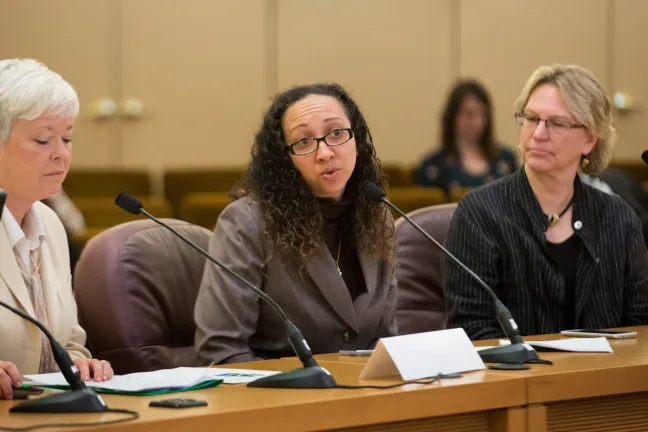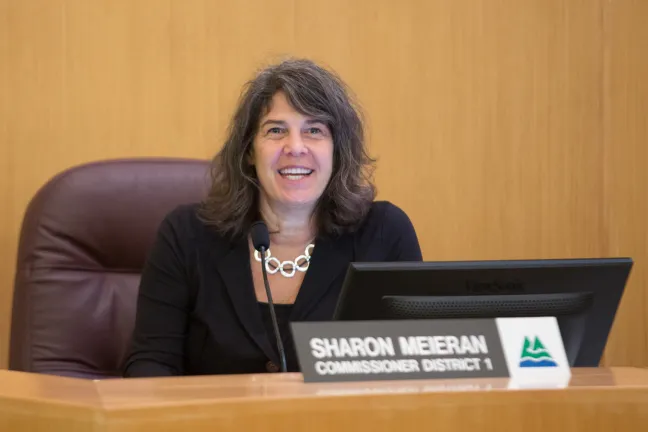State representatives could begin discussion as early as next week on legislation that would raise the state’s legal smoking age to 21, Multnomah County’s Environmental Health Director Jae Douglas told commissioners this week in a briefing on proposals by state and local governments to pass laws that reduce teen smoking rates.
If the Oregon Legislature fails to pass SB 754 A, Multnomah County’s Board of Commissioners should pass an ordinance of its own, said Health Department Director Joanne Fuller.
“Our recommendation is that we make sales to minors who are under 21 illegal, and the consequences fall to the person or organization making the sale, not the minor who bought the tobacco,” Fuller said Thursday. Police would be able to take tobacco if they people under 21 in possession, but they wouldn’t be able to arrest or cite them.
The state proposal passed the Senate last month and is awaiting a hearing in the House Committee on Health Care. If passed, the law would make it a violation for any Oregon vendor to sell tobacco or e-cigarette products to a person under 21. Fines would range from $50 for a store teller, to as much as $1,000 for a store owner who repeatedly violates the law.
If the bill becomes law, Oregon would be the third state to raise the smoking age to 21. Hawaii passed a law in 2015, and California followed in 2016. More than 200 local jurisdictions in 16 states and Washington, D.C., including 14 counties, have passed “Tobacco 21” laws.
Oregon was one of 18 states to pass smoking age laws in 1889, according to a 2016 article in the American Journal of Public Health. By 1920, all but two states had prohibited selling cigarettes to minors, and 14 states set the legal age at 21. But tobacco companies undercut the state laws, lobbying against attempts to raise the legal age to 21. In 1963, Oregon lawmakers tried, and failed, to raise its limit from 18 to 21.
When the American Medical Association began pushing in the 1980's for a federal minimum smoking age of 21, tobacco companies pushed back. Philip Morris in its 1986 five-year plan, warned that “raising the legal minimum age for cigarette purchaser [sic] to 21 could gut our key young adult market… We intend to see the AMA’s proposals die an unquiet death.”
Research shows that most smokers started as teens, and most teens get their tobacco from friends and siblings who are 18. Studies that have followed the impact of Tobacco 21 legislation find that raising the legal smoking age to 21 makes it less likely that young people ages 15 to 17 run in the same social circles as people legally able to purchase tobacco.
Researchers at the National Academies Institute of Medicine estimated in a 2015 report that if the minimum smoking age were raised nationwide, people born between 2000 and 2019 would experience about 250,000 fewer premature deaths, and 45,000 fewer deaths from lung cancer. But the 2009 Family Smoking Prevention and Tobacco Control Act prohibits the U.S. Food and Drug Administration, which oversees tobacco control, from raising the federal minimum smoking age above 18.
That has put pressure on states to act.
“This issue is very near and dear to my heart,” said Multnomah County Commissioner Sharon Meieran, who also works as an emergency room doctor. “It would be great if it could be implemented at the state level. That would be ideal. But I would love to see it implemented, at the very least, in Multnomah County.”
Multnomah County’s Board of Commissioners has already taken steps to make it harder for teens to access tobacco.
In 2015, the board established regulations on e-cigarettes, setting the legal age at 18 and banning the products from use in public places.
In 2016, it passed an ordinance requiring retailers selling tobacco to obtain a licenses, and making it easier for authorities to verify whether shops were selling to underage teens.
Oregon’s legislation passed out the Senate March 23, with a 19-8 vote. If it passes the house and is signed by Gov. Kate Brown, the law would go into effect Jan. 1, 2018.
“From everything I’m hearing it’s looking really well in the Legislature, so I think that’s a really positive thing,” said Commissioner Jessica Vega Pederson, who served two terms as a state representative before election last fall to the county board.
“My biggest concern is for the people who are between the ages of 18 and 21 and who are currently smoking, and making sure we’re providing resources for them to help them stop their addiction to tobacco,” Vega Pederson said. “This is something that’s so addictive and if you start when you’re 14, you’ve been smoking for five years by the time you’re 19. That’s a really hard situation to be in.”
Health Department Director Fuller said the county will work with health insurers who include smoking cessation services as part of their insurance plans, and “at the same time we would want to figure out where are those pockets of people who are uninsured and make sure we’re making cessation support available for them, and that the message is out in as many languages as possible.”

